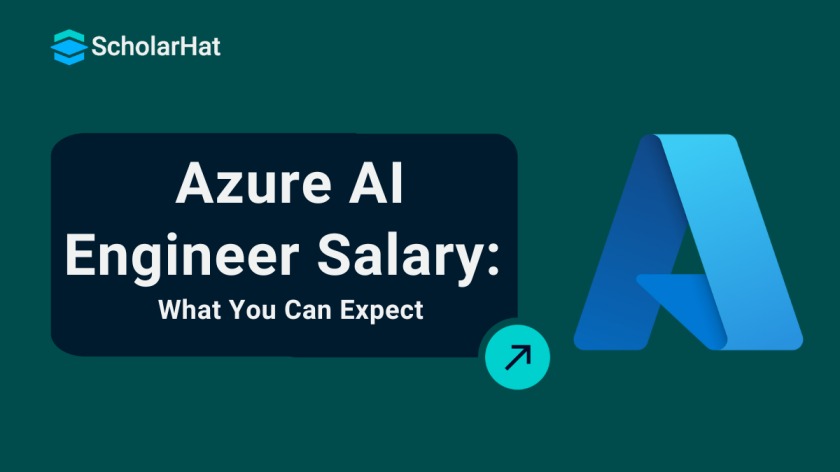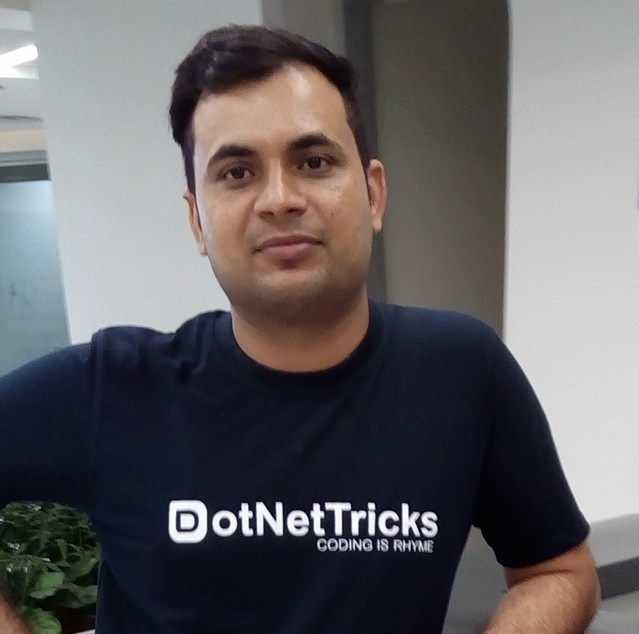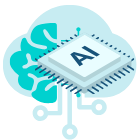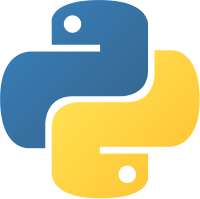30
JanAzure AI Engineer Salary: What You Can Expect
An Azure AI Engineer's salary in India varies widely based on expertise, industry, and project complexity, typically ranging from ₹6 LPA for freshers to over ₹40 LPA for top-tier professionals. Early-career engineers (1–3 years) generally earn ₹6–₹10 LPA, mid-level professionals (4–7 years) can command ₹12–₹25 LPA, and seasoned experts with 8+ years of experience often cross ₹25 LPA, with exceptional cases exceeding ₹40 LPA, especially in high-demand sectors like cloud AI solutions and enterprise-scale deployments.
In this Azure AI tutorial, you’ll explore the powerful tools and services that enable building intelligent applications with ease. Learning these skills can help you tap into rewarding career opportunities in the fast-growing cloud AI sector. To help you get started, Scholarhat’s Free Azure AI Fundamental Course will equip you with the skills needed to break into this booming industry.
| Azure Developer Experience Level | Salary Range (Per Annum) |
| 0–1 years (Fresher) | ₹3.6 LPA – ₹8 LPA |
| 1–3 years (Junior) | ₹6 LPA – ₹10 LPA |
| 3–5 years (Mid-Level) | ₹8 LPA – ₹15 LPA |
| 5–8 years (Senior) | ₹12 LPA – ₹25 LPA |
| 8+ years (Expert/Lead) | ₹25 LPA – ₹40+ LPA |
What is an Azure AI Engineer?
An Azure AI Engineer builds smart, automated tools and apps using Microsoft’s Azure cloud platform. They use tools like Azure Machine Learning and Azure Cognitive Services to create chatbots, smart recommendations, and more. Their main goal is to make these solutions not only smart but also secure and efficient.
What Does an Azure AI Engineer Do?
As an Azure AI Engineer, you’ll build tools like chatbots and prediction systems that help businesses make smarter decisions and serve customers better.
Here’s a quick look at your responsibilities:
- Designing and Building AI Solutions: Using Azure to create chatbots, recommendation engines, or tools that analyze documents.
- Creating Machine Learning Models: Training computers to learn from data and make smart choices, like teaching a new team member.
- Integrating AI into Apps: Adding intelligent features to your company’s apps and websites, making them more useful for everyone.
- Keeping Systems Secure and Private: Ensuring all data and AI tools are safe and follow privacy rules.
- Monitoring and Fixing Problems: Keeping an eye on system performance and stepping in to fix any issues.
If you enjoy solving problems and working with new technology, this role could be a great fit for you.
Azure AI Engineer Salary Structure
Now, let’s dive into the part you’re likely most interested in: how much does an Azure AI Engineer earn?
Here’s a simple breakdown of what you can expect at different experience levels, in various locations, and with different qualifications.
By Experience Level
| Experience Level | United States (USD) | India (INR LPA) |
| Entry-level | $80,000–$100,000 | ₹20–30 LPA |
| Mid-level | $120,000–$140,000 | ₹35–45 LPA |
| Senior level | $150,000+ | ₹50+ LPA |
| Lead/Principal | $180,000–$209,000 | ₹80–200+ LPA |
Azure AI Engineer Salary by Experience Level (India)
By Location (India)
| Location | Average Salary (INR LPA) |
| Bangalore | ₹30–60 |
| Hyderabad | ₹28–55 |
| Pune | ₹25–50 |
| Mumbai | ₹28–55 |
| Chennai | ₹25–50 |
| Delhi NCR | ₹28–55 |
| Kolkata | ₹22–45 |
| Tier-2 cities | ₹20–40 |
| Remote | ₹20–45 |
Azure AI Engineer Salary by Location (India)
By Certification
| Certification | Salary Boost |
| AZ-900 (Azure Fundamentals) | Low |
| AZ-104 (Azure Administrator) | Moderate |
| AZ-204 (Azure Developer) | Moderate |
| AZ-305 (Azure Solutions Architect) | High |
| AZ-400 (Azure DevOps Engineer) | High |
| AI-102 (Azure AI Engineer Associate) | High |
| AZ-500 (Azure Security Engineer) | High |
| DP-203 (Azure Data Engineer) | High |
Azure AI Engineer Salary Boost by Certification
By Job Role
| Job Role | Description |
| Entry-level AI Engineer | Starts with basic AI tasks |
| Mid-level AI Engineer | Handles more projects and teams |
| Senior AI Engineer | Leads big projects and guides others |
| Solutions Architect (AI) | Designs full AI solutions |
| DevOps Engineer (AI) | Automates AI app deployment |
| Cloud Consultant (AI) | Advises clients on AI cloud plans |
By Employer Type
| Employer Type | Key Features |
| Big companies | High pay, good benefits |
| Cloud providers | Competitive pay, stock options |
| Startups | Equity, fast-paced work |
| Consulting firms | Travel, project variety |
| Tech companies | Innovation, high pay |
| Small companies/freelancers | Flexible, variable income |
By Education
| Education Level | Salary Impact |
| Diploma | Standard pay |
| Bachelor’s | Higher pay |
| Master’s | Even higher |
| Ph.D. | Highest pay |
| Advanced certifications | Big boost |
| Non-technical | Lower pay |
Skills Needed to Become an Azure AI Engineer
To become an Azure AI Engineer, focus on these key skills to succeed and stand out.:
- Azure Machine Learning and Cognitive Services: Master these tools to build, deploy, and manage AI models on Azure.
- Programming languages: Python (most important), also R, C#, PowerShell. Python is essential for AI development; other languages help with automation and integration.
- Machine learning: Tools like TensorFlow and PyTorch enable you to create advanced AI models and analyze data.
- DevOps skills: Learn DevOps skills like automation, CI/CD pipelines, and deployment to speed up AI projects and improve reliability.
- Security and compliance knowledge: Protect data and ensure your AI solutions meet industry regulations.
- Networking basics for cloud apps: Understand how to connect and secure cloud services for smooth AI operations.
- Monitoring and troubleshooting skills: Keep your AI solutions running smoothly by tracking performance and fixing issues quickly.
If you enjoy learning new tech and working with data and code, you’re already on the right track.
Career Paths for Azure AI Engineers
If you are considering a career as an Azure AI Engineer, here is an overview of the key paths you can pursue.| Career Path | Description |
| Azure AI Engineer | Build and manage AI solutions directly in Azure. |
| Cloud Architect (AI) | Design the overall cloud and AI systems for organizations. |
| Solutions Engineer (AI) | Work closely with clients to solve business problems using AI. |
| DevOps Engineer (AI) | Automate the deployment and monitoring of AI applications. |
| Cloud Consultant (AI) | Advise companies on leveraging Azure AI for growth and increased efficiency. |
| Cloud Admin (AI) | Manage cloud resources and keep AI systems running smoothly. |
| Security Engineer (AI) | Ensure AI solutions are safe from threats and comply with security standards. |
| Data Engineer (AI) | Prepare and manage data for AI models, ensuring quality and accessibility. |
As you gain experience, you can move into senior roles or specialize further, opening up more opportunities and higher pay.
What Affects Azure AI Engineer Salary in 2025?
Several factors influence how much you can earn as an Azure AI Engineer. Here’s what matters most:
- Industry demand: Healthcare, finance, and manufacturing are investing heavily in AI, creating more jobs and higher salaries.
- Economy: Tech jobs remain well-paid, even during uncertain times.
- Security and compliance: Expertise in keeping AI systems safe and compliant is highly valued and can boost your pay.
- Automation and AI: Combining these skills makes you more valuable to employers.
- Location: Big tech hubs pay more, but remote work is opening up new opportunities everywhere.
- Certifications: Earning a Microsoft Azure certification proves your skills and can lead to higher salaries.
How to Get a Higher Salary as an Azure AI Engineer
Want to increase your earning potential as an Azure AI Engineer? Try these proven strategies:
- Learn new technology and get certified: Stay current with the latest Azure AI tools and earn certifications to validate your expertise.
- Upskill in DevOps and machine learning: These skills are in high demand and can set you apart from the competition.
- Build your network:Connect with others in theAzure community.Networking can lead to better job offers and higher pay.
The more you learn and the more people you know in the industry, the better your chances of landing a top-paying job.
Challenges for Azure AI Engineers
Every job has its challenges, and being an Azure AI Engineer is no exception. Here are some common hurdles:
- Handling complex cloud systems: Managing large-scale AI solutions can be tricky, but it’s also rewarding.
- Keeping up with new technology: The field moves fast, so continuous learning is a must.
- Making sure AI is safe and private: Protecting data and ensuring compliance is crucial and challenging.
- Managing costs: Efficiently using cloud resources helps keep projects on budget.
- Working well with teams: Collaboration is key, especially when building and deploying AI solutions.
These challenges make the work exciting and help you grow as a professional.
Future for Azure AI Engineers
Looking ahead, the future for Azure AI Engineers is bright and full of opportunity:
- More jobs in cloud and AI: As companies adopt cloud-based AI, the need for skilled engineers will keep growing.
- Higher salaries for skilled engineers: With demand rising, pay is expected to increase for those with the right skills.
- New technology like edge computing and generative AI: Innovations are creating new roles and exciting projects.
- A need to keep learning new skills: Staying up-to-date with the latest tech will help you stay ahead in your career.
If you’re ready to learn and adapt, the future is full of possibilities for Azure AI Engineers.
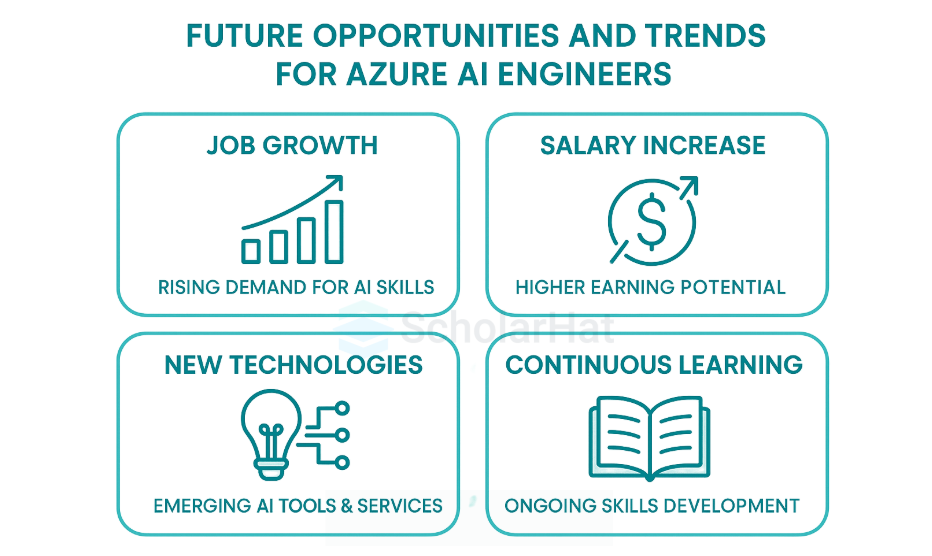
Read More - Azure Ai Interview Questions
Summary
In conclusion, the Azure AI Engineer salary is expected to rise as companies increasingly adopt AI technologies and intelligent cloud solutions. Professionals who build strong skills in machine learning, natural language processing, and Azure AI services will see better pay and greater career opportunities. Continuous learning and earning certifications will play an important role in helping you maximize your Azure AI Engineer salary in the future.
To know more about Azure fundamentals, take a look at our Azure AI Engineer Certification Training. Thousands are already transforming their futures. Why wait? Join now and start your journey today!
FAQs
Take our Azureai skill challenge to evaluate yourself!

In less than 5 minutes, with our skill challenge, you can identify your knowledge gaps and strengths in a given skill.

